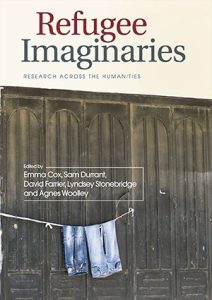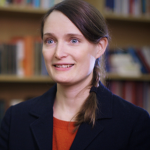Refugee Imaginaries: Research Across the Humanities

Editor(s): Emma Cox, Sam Durrant, David Farrier, Lyndsey Stonebridge, and Agnes Woolley
Publisher: Haymarket Books
Year of Publication: 2019
Print Length: 544 pages
Genre: Non-Fiction / Arts & Humanities, History, Migration & Refugee Studies
Area: Europe, Mediterranean, Lebanon, Syria
People: Palestinian, Syrian
Topic: Imagination, Research, Arts-Based Method, Asylum & Asylum Seekers, Refugees & Forced Migration, Asylum & Refugee System, Exile & Exodus, Statelessness, History, Ethics & Morality, Politics & Power, Activism, Advocacy, Law Enforcement; Law, Jurisprudence, Legal Theory; Gender, Sexuality, Biopolitics, Borders, Archive, Camps, City & Urban, Cosmopolitanism, Climate Change, Ecology & Climate, Conflict & Post-Conflict, Humanitarian Action & Humanitarianism, Media & Narratives; Memory, Remembering and Forgetting; Death & the Afterlife, Testimonies, Lived Experience, Culture & Society, Digital, Documentary Film, Narrative/Fictional Film, Poetry, Theatre, Writing, Emotions & Feelings, Hope, Sanctuary, Survival, The Notion of Home
The refugee has emerged as one of the key figures of the twenty-first-century. This book explores how refugees imagine the world and how the world imagines them. It demonstrates the ways in which refugees have been written into being by international law, governmental and non-governmental bodies and the media, and foregrounds the role of the arts and humanities in imagining, historicising and protesting the experiences of forced migration and statelessness.
Including thirty-two newly written chapters on representations by and of refugees from leading researchers in the field, Refugee Imaginaries establishes the case for placing the study of the refugee at the centre of contemporary critical enquiry.
Table of Contents
Notes on Contributors
Introduction — Emma Cox, Sam Durrant, David Farrier, Lyndsey Stonebridge and Agnes Woolley
PART I. REFUGEE GENEALOGIES
Introduction — Lyndsey Stonebridge
1. Refugees in Modern World History — Peter Gatrell
2. Theories of the Refugee, After Hannah Arendt — Ned Curthoys
3. A Genealogy of Refugee Writing — Arthur Rose
4. Genres of Refugee Writing — Anna Bernard
PART II. ASYLUM
Introduction — Agnes Woolley
5. Sexual and Gender-Based Asylum and the Queering of Global Space: Reading Desire, Writing Identity and the Unconventionality of the Law — Sudeep Dasgupta
6. Morality and Law in the Context of Asylum Claims — Anthony Good
7. The Politics of the Empty Gesture: Frameworks of Sanctuary, Theatre and The City — Alison Jeffers
PART III. THE BORDER
Introduction — Emma Cox
8. Docu/Fiction and the Aesthetics of the Border — Agnes Woolley
9. Crossings, Bodies, Behaviours — Liam Connell
10. The Digital Border: the Media of Refugee Reception during the 2015 Migration ‘Crisis’ — Lilie Chouliaraki and Myria Georgiou
PART IV. INTRA/EXTRATERRITORIAL DISPLACEMENT
Introduction — Sam Durrant
11. The ‘Dead Road’, Displacement, and the Recovery of Life-in-Common: Narrating the African Conflict Zone — Maureen Moynagh
12. ‘What do you do when you cannot leave and cannot return?’: Memoir and the Aporia of Refuge in Hisham Matar’s The Return — Norbert Bugeja
13. ‘A Man carries his door’: Affective Displacement and Refugee Poetry — Douglas Robinson
14. Reframing Climate Migration: A Case for Constellational Thinking in the Writing of Teju Cole — Byron Santangelo
PART V. THE CAMP
Introduction — Emma Cox
15. Memories and Meanings of Refugee Camps (and more-than-camps) — Elena Fiddian-Qasmiyeh
16. Writing the Camp: Death, Dying and Dialects — Yousif M. Qasmiyeh
17. Reel Refugees: Inside and Outside the Camp — Madelaine Hron
PART VI. SEA CROSSINGS
Introduction — David Farrier
18. Zoopolitics of Asylum Seeker Marine Deaths and Cultures of Anthropophagy — Joseph Pugliese
19. The Mediterranean Sieve, Spring and Seametery — Hakim Abderrezak
20. ‘Island is no arrival’: Migrants’ Islandment at the Borders of Europe — Mariangela Palladino
21. At Sea: Hope as Survival and Sustenance for Refugees — Parvati Nair
PART VII. DIGITAL TERRITORIES
Introduction — Agnes Woolley
22. Networked Narratives: Online Self-Expression from a Palestinian Refugee Camp in Lebanon — Mary Mitchell
23. Refugee writing, Refugee History: Locating the Refugee Archive in the Making of a History of the Syrian War — Dima Saber and Paul Long
24. Digital Biopolitics, Humanitarianism and the Datafication of Refugees — Btihaj Ajana
25. The Messenger: Refugee Testimony and the Search for Adequate Witness — Gillian Whitlock & Rosanne Kennedy
PART VIII. HOME
Introduction — David Farrier
26. Home and Law: Impersonality and Worldlessness in J. M. Coetzee’s The Childhood of Jesus and Jenny Erpenbeck’s Gehen, Ging, Gegangen — Daniel Hartley
27. Autobiography of a Ghost: Home and Haunting in Viet Thanh Nguyen’s The Refugees — Mireille Rosello
28. Homing as Co-creative Work: When Home Becomes a Village — Misha Myers and Mariam Issa
PART IX. OPEN CITIES
Introduction — Sam Durrant
29. ‘Another politics of the city’: Urban Practices of Refuge, Advocacy and Activism — Jonathan Darling
30. The Welcome City? — Hannah Lewis and Louise Waite
31. In the City’s Public Spaces: Movements of Witnesses and the Formation of Moral Community — André Grahle
32. Open/Closed Cities: Cosmopolitan Melancholia and the Disavowal of Refugee Life — Sam Durrant
Index

Emma Cox is Head of Drama, Theatre & Dance Department of Royal Holloway, University of London. Her research examines cross-cultural intersections of migration, memory and place in performance and visual culture. She is the author Performing Noncitizenship (2015), Theatre & Migration (2014), and editor of the play collection Staging Asylum (2013). She is the contributing editor of Performance and Migration (2021), a video and publishing collaboration between Digital Theatre+ and Routledge, featuring content by scholars and artists. Her current work concerns cultural and performance histories associated with biological and digital human remains.
Source: https://pure.royalholloway.ac.uk/en/persons/emma-cox
More from Emma Cox in this library, click here.

Sam Durrant is Associate Professor of Postcolonial Literature at the University of Leeds. He is broadly interested in the relationships between literature, memory, race and community, particularly as they pertain to the fields of postcolonial studies and critical theory. He began his career focusing on the problems involved in memorialising the traumatic histories of racial oppression that continue to haunt our postcolonial era. These problems are the central concern of his first monograph Postcolonial Narrative and the Work of Mourning: J.M Coetzee, Wilson Harris and Toni Morrison (State University of New York Press, 2004). Since then, he has continued to work on memory and trauma in postcolonial contexts.
Source: https://ahc.leeds.ac.uk/english/staff/42/dr-sam-durrant
More from Sam Durrant in this library, click here.

David Farrier is Senior Lecturer in Modern and Contemporary Literature at the University of Edinburgh. His current research is in literary responses to environmental change and the Anthropocene. He is especially interested in the way contemporary poetry responds to or can be read in light of deep time and the difficulty of imagining environmental futures; and in the problem of defining an Anthropocene poetics. His previous work looked at the relationship between asylum/refugee discourse and postcolonial studies. His most recent book, Footprints: In Search of Future Fossils (4th Estate / Farrar, Straus & Giroux, 2020) was awarded the Royal Society of Literature’s Giles St Aubyn award for non-fiction in 2017 and will be translated into seven languages. He has written for Aeon and The Atlantic.
Source: https://www.research.ed.ac.uk/en/persons/david-farrier
More from David Farrier in this library, click here.

Lyndsey Stonebridge is Professor of Humanities and Human Rights at the University of Birmingham. Her work focuses on twentieth-century and contemporary literature, political theory, and history, Human Rights, and Refugee Studies, drawing on the interdisciplinary connections between literature, history, politics, law, and social policy. Her early work was concerned with the effects of modern violence on the mind in the twentieth and twenty-first centuries: The Destructive Element (1998), Reading Melanie Klein (1998) and The Writing of Anxiety (2007). Her more recent writing has focussed on the creative history of responses to that violence in two awarding-winning books: The Judicial Imagination: Writing after Nuremberg (2011), which won the British Academy Rose Mary Crawshay Prize, 2014, and Placeless People: Writing, Rights, and Refugees (2018), winner of the Modernist Studies Association Best Book Prize 2018. In 2020 she published a collection of essays, Writing and Righting: Literature in the Age of Human Rights (2020), which drew on her journalism and work with two major interdisciplinary research projects Refugee Hosts and Rights4Time.
Source: https://www.birmingham.ac.uk/staff/profiles/english/stonebridge-lyndsey
More from Lyndsey Stonebridge in this library, click here.

Agnes Woolley is Lecturer in Transnational Literature and Migration Cultures at Birkbeck, University of London. Her research focuses in contemporary and postcolonial literature, theatre and film, with a focus on concepts of migration and diaspora. She is the author of Contemporary Asylum Narratives: Representing Refugees in the Twenty-First Century (Palgrave Macmillan, 2014) and has published extensively on asylum, refugee arts, climate change and contemporary literature. Her current research examines the interrelationship between contemporary screen cultures and geopolitical refugee discourses in the forthcoming book Moving Images: Refugees in Contemporary Screen Culture (Bloomsbury, 2022). She is a regular contributor to openDemocracy, reporting on migration issues and works with grassroots refugee organisations in London.
Source: https://www.bbk.ac.uk/our-staff/profile/9170272/agnes-woolley
More from Agnes Woolley in this library, click here.
